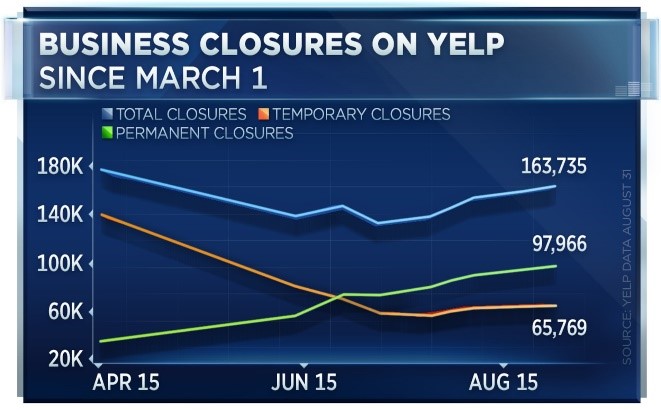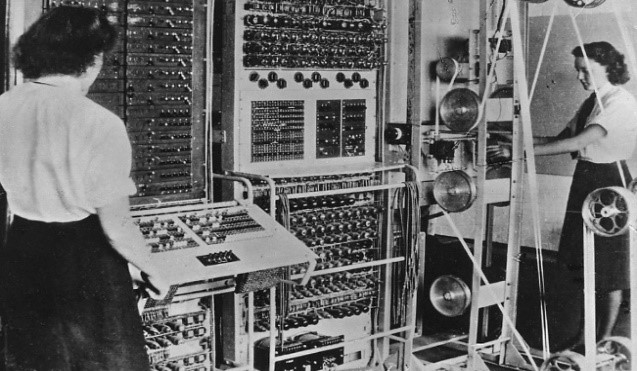What can we expect after COVID-19
The biggest lesson companies have learned during the pandemic is likely the importance of the need to respond rapidly, accordingly, it is our belief that, after COVID-19 is over, business leaders will recognize the critical roles of business processes and business rules much more than before.
The effects of the pandemic
The dramatic spread of COVID-19 has disrupted lives, livelihoods, communities and businesses worldwide. While scientists and doctors around the world are working hard to save lives, there are companies and organizations that are struggling to survive.
As stated in an article published by Bloomberg in January 2021, over 340 companies declared bankruptcy in the USA in 2020 with Covid-19 partly, if not wholly to blame. Additionally, current Yelp data shows that 97,966 of U.S. businesses closed permanently between March and August 2020.
 There is a significant possibility that some of the companies and organizations listed might have had financial difficulties even before the coronavirus pandemic. However, the devastation caused by the virus had clearly contributed to their financial collapse.
There is a significant possibility that some of the companies and organizations listed might have had financial difficulties even before the coronavirus pandemic. However, the devastation caused by the virus had clearly contributed to their financial collapse.
It is suggested that the reasons behind such commercial failure were likely the reduced market demand during this critical time, and disruptions to the supply chain. As has been done after earlier crises, it is expected that studies investigating the root causes of this commercial downfall be conducted. Further clarification will then arise, and the information be used for similar potential emergencies.
Necessity is the mother of invention
There are surely many reasons that may lead companies to bankruptcy. However, the struggle for survival in the business world can often motivate one towards critically examining the complicated issues involved. This could then result in the positive changes needed to make the business work.
Let us take World War 2 as an example of a tragedy which has since been recognized as one of the worst crises to occur on this planet. During this war of the early 20th century, much of humanity was struggling to stay alive. As everyone knows, survival depends on many different things. One of those things at the time was the need to crack the codes from Hitler’s army, which was done successfully with the invention of the Colossus.
The Colossus
From the machine this article was written on to the processing power of a smart phone, modern computing would not be what it is today without the invention of Colossus, the world’s first set of computers used by the British during World War 2, as shown below.
 Similarly, business environments have learnt lessons from dealing with this pandemic which, via innovative ideas, will help to improve how business is conducted, thus resulting in better business environments.
Similarly, business environments have learnt lessons from dealing with this pandemic which, via innovative ideas, will help to improve how business is conducted, thus resulting in better business environments.
The importance of rapid response
While the whole world has learned a lot during the pandemic, the biggest lesson we have all learned is likely the importance of the need to respond rapidly to emergencies.
Those countries that responded early to the pandemic found themselves in a better place than others. In contrast, nations who reacted later were affected relatively more severely with some of them still struggling.
Similarly, families and individuals who acted early in response to the crisis coped better than late responders. Certainly, they did not need to pay double for masks and sanitizer, for which, in this regard, I take the chance to thank my wife who responded rapidly by stocking up for this crisis.
The same approach is applicable to the field of business. Companies who early assessed the potential impacts and prepared well-defined plans must now surely be in a more positive place than firms who responded late to the crisis.
Undoubtedly, assessing the potential impacts of a crisis requires numerous strategies, risk analyses, and financial analyses to be undertaken by company executives. However, ultimately, through comparative analysis, it is necessary to understand the effectiveness of company interaction with the entire community. This in turn leads one to consider the answers to these questions:
- How are things done now?
- How far can we change the way things are done now?
The roles of business processes & business rules
While the above-mentioned questions sound basic and straightforward, they are not as simple as first thought. Owing to the lack of quick thinking, the answers for many are just not available. This is largely down to the fact that most companies did not recognize the precise roles of business processes and business rules during this critical time.
Today, most companies deal with business processes in instructional document format using standard operating procedures (SOPs), or user manuals. Unfortunately, this often means that if someone wants to know how things are done, they must filter through many different documents, leaving one totally confused.
Furthermore, business rules are often dealt with even more inefficiently. They are frequently undocumented or just handed over to an IT developer who subsequently codes the rules into the firm’s filing system.
Although detailing the organizational roles of business processes and business rules requires more than laid out in this paper, it can generally be said that:
Business Rules: are the brains that control and guide the gears.
Business processes: are the gears that run the company. While
Thus, if these business roles were recognized as such, answers to the previous questions would immediately be known and, with technical aid, crises could be responded too more rapidly.
Changes to business rules or business processes
Even though the two roles are not always given due credit, it appears that most of the changes made in response to the pandemic were either in business rules or business processes. This alone proves the significance of the roles played by processes & rules inside a company and how vital they are when the call arises to respond rapidly to an emergency.
For the sake of argument, the following are examples of rules experienced by most people during the time of Coronavirus:
- Customers must wear masks before entering the mall.
The above change is an essential but simple rule added in response to the pandemic crisis. Nonetheless, although this is a relatively easy rule to announce to the public, other changes may also affect the business process such as:
- Customers must hold valid permission before visiting the bank.
This change requires adjusting a business process because it means that, instead of visiting the bank immediately, customers must first take preliminary steps. Similarly, the bank must add the step of verifying permission validity to the workload of employees. It is a change requiring alteration of a process, yet it is still a relatively easy change since it involves a manual rule. The following, however, is an example of how a bank might change a rule coded into the system as a potential response to a pandemic:
- Loan contracts may only be executed by customer service representatives.
This case necessitates the bank either postponing execution of a loan during a pandemic or seeking the help of the IT department to adjust the rule.
COVID-19 has stimulated the need for flexible operations
We believe that the whole world will not be same as it was before COVID-19, particularly from the business perspective. This is because, in order to adapt, we have experienced different, previously unacceptable, ways of conducting business. This involves practices such as remote working which, in global surveys, is currently being shown as a positive change. The surveys have highlighted that most office employees have no wish to work as before, opting instead for the more preferable hybrid remote-office model in a quest to move forward in the business world.
Thus, it is our belief that the recognized importance of rapid response to a crisis in the business world will stimulate the need for flexible operations. Assurance that companies are ready to continue operating no matter the situation will be of paramount importance. This will mean, not only accepting flexibility in how employees work, but also recognizing the roles that business processes and business rules play. It is essential that companies realize how relying on these two vital operations can help them to survive in crises. This is true especially if readily available sophisticated tools such as process & rules engines are utilized.
Conclusion
It is important to realize that sole dependence on business processes and business rules may not be enough to aid survival in a crisis. Additionally, it is possible these two operations may not protect a company from certain negative impacts. To reassure, however, we are saying that having well-defined business rules and business processes with the aid of technology can undoubtedly help a company to respond rapidly in a crisis, necessary to achieve ultimate success.
enough to aid survival in a crisis. Additionally, it is possible these two operations may not protect a company from certain negative impacts. To reassure, however, we are saying that having well-defined business rules and business processes with the aid of technology can undoubtedly help a company to respond rapidly in a crisis, necessary to achieve ultimate success.
Accordingly, it is our belief that, after COVID-19 is over, business leaders will recognize the critical roles of business processes and business rules much more than before. This will mean that developments in these areas will not only be more accepted but counted as essential to a company’s success when faced with the unexpected.








